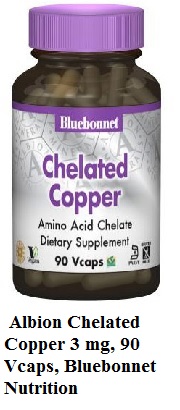 A trace mineral, the body does not require large amounts of copper but, nevertheless, it is involved with several key bodily functions. That's why ensuring the body gets an adequate supply is so important.
A trace mineral, the body does not require large amounts of copper but, nevertheless, it is involved with several key bodily functions. That's why ensuring the body gets an adequate supply is so important.
Copper and the Blood
Contributing a lot to the health of the body, copper is a necessary part of the body's ability to produce hemoglobin. It also works together with iron in the formation of red blood cells.
Copper and the Bones
In addition, without the trace mineral, copper, the body could not complete the process of building the bones that make up the skeletal system. In fact, it is one of the minerals the body relies on to help keep bones strong. Strong bones are less likely to break, fracture or become brittle. Strong bones can also keep osteoporosis from developing.
Copper and the Skin
Copper, though needed only in very small quantities, plays an important role in the formation of two components that are vital to healthy skin: elastin and collagen. Collagen is present in the skin's connective tissues and it plays a crucial role in the body's ability to quickly and thoroughly heal all wounds. Elastin is what gives skin the ability to stretch and spring back into shape. It is also what helps delay the onset of wrinkles...which usually show up sooner or later.
Copper and the Hair
Copper is one of the ingredients found in the hair's pigmentation. Pigmentation is what gives hair its color and its sheen.
Copper and the Nervous System
This minimal mineral must be present in order for the body to make the neurotransmitter noradrenaline. This is often referred to as the fight or flight hormone and is primarily responsible for the body's reactions to dangerous or stressful situations.
Copper and the Heart
Copper is also important for lowering risks associated with early stages of heart disease, including heart arrhythmia, high blood pressure, high cholesterol and stroke. It gives the immune system a boost and finally, it is involved in the processes that manufacture important anti-oxidant enzymes.
Dietary Sources of Copper
Green vegetables, prunes, pineapples, beans, peas, lentils, potatoes, sweet potatoes, turnip greens, mushrooms, beef liver, fish, mackerel, clams, crabmeat, lobster, oysters, nuts (particularly walnuts, peanuts, Brazil nuts and cashews), pumpkin, sunflower and sesame seeds, breads and cereals made from whole grains and barley are some good sources of copper.
Fortuneately, the body can store this mineral for later use. Because of this, it is not necessary to rely on a daily dietary intake. However, there is a recommended daily allowance for copper and it is 1.2 milligrams.
Symptoms of a Copper Deficiency
Despite its value to health and so many bodily functions, for most people, the likelihood of developing a copper deficiency is practically non-existent.
There are two reasons for this.
First, the body maintains around 100 - 500 mg so it is unusual for this mineral to run low. Another reason has to do with the fact that most people, until recently, could get plenty of copper simply by drinking water. Before the more common PVC piping of today came along, almost all pipes used to carry water were made out of copper. With copper pipes, trace amounts of copper regularly leach into the water system.
While uncommon, when the body does experience a deficiency of copper there usually is a corresponding deficiency of iron. That is why anemia is one of the symptoms. Severe anorexia or starvation, and serious kidney problems (which are very rare) can all contribute towards a copper deficiency. Other symptoms include dry skin and problems with hair.
Copper is so commonly available to the body that even the best daily multivitamin will commonly only contain about half the recommended amount.









